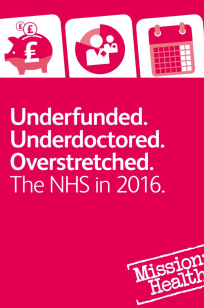News / Boost funding and doctor numbers, says RCP
 The report – Underfunded, underdoctored, overstretched – the NHS in 2016 – assesses the NHS as struggling to cope under the increasing pressure of rising demand and inadequate funding, with resulting workforce pressures threatening patient safety.
The report – Underfunded, underdoctored, overstretched – the NHS in 2016 – assesses the NHS as struggling to cope under the increasing pressure of rising demand and inadequate funding, with resulting workforce pressures threatening patient safety. The report pointed to demand increases of 4% every year compared with real terms funding increases of just 0.2% per year to 2020 – with social care cuts piling further pressure on NHS services. It said medical student numbers were falling and seven out of 10 physicians were working on a rota with a permanent gap. It also claimed hospitals were failing to fill two in five of the consultant physician posts they advertise.
Staff increasingly felt like ‘collateral damage’ in the battle between rising demand and squeezed budgets, the college said. It added that 95% of physicians-in-training report that poor staff morale is having a negative impact on patient safety in their hospital.
NHS funding had to increase, the report said, to meet demand. Efficiency savings targets needed to be realistic and funding for transformation must be protected.
Increases were needed in the number of medical students and doctors in training – with incentives put in place to attract doctors to work in the most challenging and in-demand areas of medicine. New solutions were also needed to workforce pressures.
RCP registrar Dr Andrew Goddard described the NHS as being at ‘a point of no return’. ‘The NHS in its current form is unsustainable without a significant increase in funding,’ he said. ‘We can’t continue to provide ever-more expensive treatments to an ever-increasing group of patients and not expect the system to collapse.
HFMA director of policy Paul Briddock said the association supported a lot of the analysis in the RCP report. ‘The report calls for an increase in NHS funding, however, given this may not be feasible, the dialogue needs to focus on what the NHS can and cannot afford to deliver,’ he said. ‘The NHS is currently living beyond its means, and we share the report’s sentiment that this cannot be sustained in the long term.’
He added that better resource planning and recruitment were needed to reduce the reliance on, and premium paid for, agency staff. ‘It’s vital we move to a position of over supply not under supply of the NHS workforce to eliminate the agency spend cycle we are currently in,’ he said (see the HFMA’s full response).
NHS Confederation director of policy Dr Johnny Marshall said the report was an important contribution to the debate on the future of the NHS. ‘Further growth in the numbers of doctors is currently necessary, but it will become unaffordable if allowed to continue indefinitely – putting healthcare at risk. It must go hand in glove with developing new roles, such as that of physician associates and developing new models of care that are more in-tune with patients’ needs, such as moving services from hospital settings to community settings.’
Related content
Costing conference 2025
The Institute’s annual costing conference provides the NHS with the latest developments and guidance in NHS costing.
Value masterclass 2025
The value masterclass shares examples of organisations and systems that have pursued a value-driven approach and the results they have achieved.